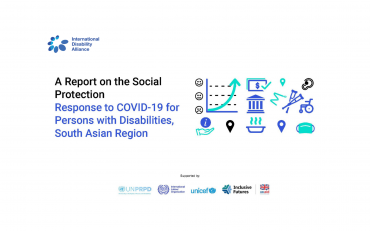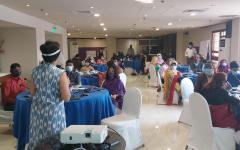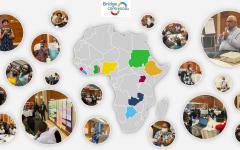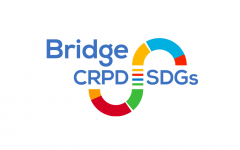The purpose of this report is to provide an overview of the social protection response and recovery initiatives by countries in the South Asian Region towards people with disabilities from the perspective of DPOs. Read more.
Towards inclusive social protection systems to advance the rights of persons with disabilities 2019-2020
Building on the process facilitated by ILO and International Disability Alliance (IDA) that led to the adoption of a joint statement on inclusive social protection[i] and the current momentum on universal social protection, this UNPRPD funded initiative, implemented jointly by ILO and UNICEF in close cooperation with IDA seeks the collaborative development of capacity across countries, DPOs, development agencies and academia to support reforms towards inclusive social protection systems fostering inclusion and empowerment, in compliance with the UN Convention on the Rights of Persons with Disabilities (UNCRPD).
Background
There is increasing evidence confirming that persons with disabilities are more exposed to risk of poverty[ii] due to barriers in accessing employment, education and health care as well as disability related costs[iii] and lack of access to support services. It is also widely acknowledged that social protection is critical to support the inclusion of persons as disabilities as reflected at global level within the SDGs and the Addis Ababa Agenda for Action and at regional level in initiatives such as the UN-ESCAP Incheon strategy implementation[iv] and the recent UN ESCWA report[v].
Despite these acknowledgements, in most countries the majority of persons with disabilities do not benefit from effective social protection. There are many challenges in terms of actual design, coverage and adequacy of programs:
- The latest ILO estimates show that only 27.8 per cent of persons with severe disabilities worldwide receive a disability benefit[vi], with only 11% of countries having schemes seeking to provide universal coverage. There are wide regional discrepancies with almost universal coverage in Eastern Europe, but only 9.4 per cent for Asia and the Pacific and even less in Africa.
- Recent research and studies supported by DFAT[vii] and DFID[viii] confirmed the importance of social protection and significant challenges related to eligibility determination, adequacy of benefits, as well as limitation of existing schemes in effectively supporting social inclusion and economic empowerment, among others.
- The UN CRPD Committee has consistently recommended to countries across regions to reform their social protection system applying the CRPD shift of paradigm so that they effectively contribute to inclusion across the life cycle, with particular attention to disability assessment, coverage of disability related costs and access to support services. The 2016 thematic report of the Special Rapporteur on the Rights of Persons with Disabilities provided comprehensive overview of issues to be tackled and offered broad recommendations.
The 2018 Joint statement “Towards inclusive social protection systems supporting full and effective participation and inclusion of persons with disabilities”, represents a consensus among some UN agencies, bilateral development agencies, DPOs and NGOs of the key issues to tackled and the direction of reforms to undertake to build inclusive social protection systems.
Objective of the project
The UNPRPD initiative seeks to develop practical guidance for countries, development agencies and DPOs for the reform of different critical aspects of social protection systems. The main components of the project are:
- Collaborative production of thematic background papers reviewing recent or on-going reforms and proposing possible technical solutions to issues related to:
- Accessibility and non-discrimination in social protection systems;
- Disability assessment and eligibility determination as well as data collection and information systems;
- Specific subgroups of persons with disabilities such as children, older persons and most marginalized groups;
- Gender equality
- Interlinkage with employment, access to support services and health;
- Social protection in humanitarian contexts - Contribute to mainstreaming Disability in Inter-Agency Social Protection Assessment (ISPA) tools
- Joint learning with countries engaged in reform towards inclusive social protection through provision of technical assistance
- Support to effective DPO engagement in reform of social protection system
- Development of technical guidance documents and training modules
The project will be implemented with extensive consultation and exchange with social protection and disability specialists from countries and development agencies, DPOs, academia. It will seek evidence and practice based technical consensus to develop missing technical resources required by the different stakeholders as well as increase mobilization for CRPD compliant inclusive social protection.
[i] A joint statement “Towards inclusive social protection systems supporting full and effective participation and inclusion of persons with disabilities”, 2018
[ii] Banks, L. M., Kuper, H., & Polack, S. (2017). Poverty and disability in low- and middle-income countries: A systematic review. PLoS ONE, 12(12), e0189996.
[iii] Mitra, Sophie et al (2017) Extra costs of living with a disability: A review and agenda for research. Disability and Health Journal , Volume 10 , Issue 4 , 475 – 484
[iv] High-level Intergovernmental Meeting on the Midpoint Review of the Asian and Pacific Decade of Persons with Disabilities, 2013-2022
[v] UNESCWA (United Nations Economic and Social Commission for Western Asia). 2017. Strengthening Social Protection of Persons with Disabilities in the Framework of the 2030 Agenda.
[vi] ILO Social Protection World Report, 2017
[vii] (2018)). Disability - inclusive social protection in Nepal: A national overview with a case study from Tanahun district And Lena M Banks, and al (2018) Disability-inclusive social protection in Vietnam: A national overview with a case study from Cam Le district. International Centre for Evidence in Disability Research Report: London, UK.
[viii] Development Pathways, DFID upcoming



